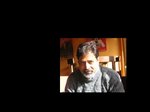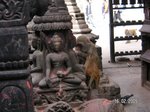I do not subscribe to the modern obsession with optimism: with being optimistic and, with projecting it. I am, in fact, slightly suspicious of people who project optimism, unless it is naïve; like that of childhood, or of youth. A fifty year old optimist is a perversion of nature or a politician, which amounts to the same thing.
Over the years, I have become used to friends and strangers responding with- why are you such a pessimist? On several occasions, their reactions have been strong enough to throw me into grave self doubt. Am I wrong? Despite the doubt however, I have never wavered from my instinctive feeling that pessimism is, at least, as positive a force in life as optimism. Pessimism is real, it is meaningful and, above all, it is honest. Optimism on the other hand is often chimerical and, is frequently used to subvert individual and social integrity: to sell dreams of an alternate reality to those who are unhappy with their current one and, who know that they have been shorn of all power to alter their situation. It is used to sell war to those who are at peace, to sell brutality to those who would otherwise remain, merely, callous, to sell passive acquiescence to those who would otherwise revolt.
What is wrong with pessimism? When things are bleak is it not better to see them as they are and, to say them as you see them? Pessimism is not loss of hope. They frequently coexist. It is not depression. And, even depression need not necessarily signify loss of hope, at least not a complete loss.
Pessimism is not defeat, or defeatism. Robert Bruce could not have been optimistic of his chances when he waged his final battle against his enemies. In my view, he would never have won that last battle had he not been realistic and, pessimistic.
Pessimism does not mean you stop making an effort. History is replete with examples of people who overcame “insurmountable” odds. What about Helen Keller? What about Gautam Buddha? I don’t think either of them would have been optimistic about their chances when they started on their quest. Let us not forget that Siddharth the prince must have been just like us when he left home: full of confusion, anxiety and despair. He could not have been optimistic about finding answers to his questions. On the contrary, it seems to me that the path to nirvana must have frequently filled him with despair, what to speak of mere pessimism.
Pessimism, in fact, can and often does, lead to great achievement. Those who decry it are probably people of shallow faith. They fail to appreciate the dogged, determined, stubborn quest for survival that actuates life. They refuse to see that pessimism is the missing link that adds to make up the critical minimum mass necessary for the chain reaction to begin.
If you are not on a high then you are low, is the way most people think nowadays. Or, if you are not riding a rainbow then you are depressed. This is one of the reasons for the rampant proliferation of psychiatrists, counselors and anti depressants in the west and nowadays, in India too. All of a sudden we are surrounded by selves unable to cope. Each of us would probably have also felt that way at least once in our lives till now. Why is this? What happened to the much touted ability of homo-sapiens to adapt, change and, cope? Maybe is this is a pointer to the end of the road for “people”. But I think not. It seems to me that the pessimism-optimism binary is contributing to the exponential increase in the psychological fragility of people. Maybe, having survived several millennia of evolution and change without being hooked to this binary, we are finally tired of the effort required to live with without too much chimera for support.
Besides a fundamental rejection, I also object to the optimist-pessimist binary for the ease with which it lends itself as a tool for manipulating people. Some manipulators are "good" and they help those they manipulate with the help of this binary but the overwhelming bulk of the manipulation is bad, very, very bad. We are now well and truly in a cycle of - increasing fragility leading to a bigger handle to the manipulators (the bad ones), leading to increasing fragility ..... This increasing fragility of self suits the people who control the levers of today's world. The more people have to struggle with maintaining an equilibrium of sanity the less likely they are to join in dissent and other "harmful" activities. Have you noticed how society acts on the assumption that it has the right to a greater say in the lives of people who are struggling with their selves? And, most of the time it gets away with this invasion into people's autonomy because the need to be accepted is one of the most overwhelming.
In a culture of “hope”, those who benefit from it frequently sell lies. False hope is worse than no hope. The fallout of failure is much worse when false hope is dashed, as is bound to happen. The world is drowning in the reaction of people whose hopes and expectations have been dashed. Levels of violence, cynicism and despair are at an all time high. Is it not better to take a realistic, hard headed view of things, acknowledge the extreme difficulties of the long and arduous path to be traversed and, ask people to be prepared to forge ahead step by painful step. I think this is the only way that we can rebuild our shattered society into a semblance of wholeness? I am unable to persuade myself that my view of the world (current or future) is negative, though I do have to guard against negativity like anyone else.
We Indians (and other pre-modern people) have a much better alternative to this see-saw. Our culture suggests that we cultivate a state of mind called “sam bhav”. It connotes a neutral state of mind. Neither high nor low. Take things as they come. Don’t expect good fortune, or bad. I should think such a mind is no more difficult to cultivate than any other disciplined mindset. To paraphrase Herman Hesse, we must learn to think, to fast and, to wait.
To conclude, pessimism is not the death that it is usually touted to be. It is not the darkness of abject despair. It is the expectation that there will be light at the end of the tunnel, the hope of which keeps you going long after reason, and optimism, would have made you give up. It is life. Optimism on the other hand is, frequently, manic.
Monday, January 14, 2008
The Middle Class
The mittelstand, or “middle estate” of Germany, which lost its entire savings in the hyperinflation between 1921 and 1924 was instrumental in the rise of Hitler. Having been robbed by democracy, they plumped for fascism.
Here is an example of the true nature of the middle class. Hyper Inflation would not make a nation of farmers, artisans and workers switch from democracy to fascism. They would maintain an ethical (psychological) balance between their material needs and their social and political needs. In other words, mental and psychological instability is an attribute of the middle class. Such people are so attached to their material and creature comforts that they will kill for them and, certainly don’t mind millions getting killed for the sake of them. This is the root of fascism.
Here is an example of the true nature of the middle class. Hyper Inflation would not make a nation of farmers, artisans and workers switch from democracy to fascism. They would maintain an ethical (psychological) balance between their material needs and their social and political needs. In other words, mental and psychological instability is an attribute of the middle class. Such people are so attached to their material and creature comforts that they will kill for them and, certainly don’t mind millions getting killed for the sake of them. This is the root of fascism.
Labels:
Bourgeoisies,
Democracy,
Fascism,
Genocide,
Nation-State
Clairvoyance Machines
What do you mean when you say (to yourself or to another) that you “know”? For example, I know ………..
Think of a thousand examples. Think of a million. In each you will find that the expression “I know” is premised upon an ability to predict the future. This is extraordinary!!!!
It means that we are clairvoyance machines. All life is clairvoyant. Knowledge is clairvoyance. Of course, on average, we are only approximately clairvoyant. Despite knowledge we can not predict with certainty. But we can predict. That is the point. Life is all about predicting the future.
It means that clairvoyants are people whose ability is more developed that the average persons. It validates astrology, palmistry, tarot, tea leaves, crystal balls, magic sticks, face readers and everyone else who claims to predict. It is superfluous to add “the future” because predictions can only be about the future. So, as “knowledge” gets refined it becomes more and more about predicting the future. As “civilizations” decay, this predict-ability becomes more and more about the self. Since, “civilization” is about the self, collective and individual. In other words, the inevitable “end” of all “civilization” is to perfect the art of prediction.
Why is it then that astrology and all the other methods and means used by people to aid their powers of prediction do not give good results? Or, in other words, give such unsatisfactory results. Because, like any other “system” of “thought”, these methods are based upon a simplification of reality; which is both chaotic and complex. The simplification, which modernity generally calls a “theory”, is necessary because the reality is too complex (and chaotic) to be comprehended. In other words, this reality is too complexly chaotic (or chaotically complex) to be comprehended directly. It must be put through a “mill” that grinds (into comprehensible bits), grades (into collections of uniform size) and arranges (into groups of “similar” types) the reality inputs that we receive.
What is the mill? We are the mill? Our whole body is the mill. Every pore of our body, every organ, every sense, is geared to filtering the onslaught of inputs that reality is. Filtering it, grinding, it grading it, arranging it, making “sense” of it. With the object to refining one’s “knowledge” about reality. Why should we want to “know” (or have knowledge about) reality? Because, we need to “predict” reality. Why do we need to predict reality? Because, the ability to predict reality is crucial to our survival. Without such ability our chances of survival are greatly diminished.
Assuming Darwinian natural selection, it is obvious that once it is accepted that the ability to “predict” reality is crucial to survival this ability must increase over time. Those with a greater ability to predict are more likely to survive (and propagate) as compared with those with a lesser ability.
But what is the object of this whole game? I don’t know. Who are the “greatest” humans in any situation? They are the witch doctors, the shamans, the crystal ball readers, the palmists, the astrologers, the clairvoyants. In fact, the clairvoyants are the greatest among these greats because they don’t need any system, any theory, to be able to predict. They have the ability to pluck out the face of the future from the masses of complexly chaotic information that is available to all of us. Why do I say “face”? Because, I don’t think they “see” the future in multiple dimensions. They probably see an image of the future. One can use one of the thousands of descriptions, real and imaginary, that are available, to describe what happens. Both, the real and the imaginary are, probably, equally “true”.
What is true, what is not; what is real and what is not? I think that if we see ourselves as clairvoyance organisms (life forms, creatures, whatever) then these distinctions cease to have the kind of meaning that we are used to giving them. Imagination is as “real” as anything else. Of course, reality exists. But ‘reality’ does not exist as knife sharp distinct from ‘imaginary’. There is a huge area of overlap. Theoretically, one could learn to live in this area, able to partake of both the “worlds”.
Think of a thousand examples. Think of a million. In each you will find that the expression “I know” is premised upon an ability to predict the future. This is extraordinary!!!!
It means that we are clairvoyance machines. All life is clairvoyant. Knowledge is clairvoyance. Of course, on average, we are only approximately clairvoyant. Despite knowledge we can not predict with certainty. But we can predict. That is the point. Life is all about predicting the future.
It means that clairvoyants are people whose ability is more developed that the average persons. It validates astrology, palmistry, tarot, tea leaves, crystal balls, magic sticks, face readers and everyone else who claims to predict. It is superfluous to add “the future” because predictions can only be about the future. So, as “knowledge” gets refined it becomes more and more about predicting the future. As “civilizations” decay, this predict-ability becomes more and more about the self. Since, “civilization” is about the self, collective and individual. In other words, the inevitable “end” of all “civilization” is to perfect the art of prediction.
Why is it then that astrology and all the other methods and means used by people to aid their powers of prediction do not give good results? Or, in other words, give such unsatisfactory results. Because, like any other “system” of “thought”, these methods are based upon a simplification of reality; which is both chaotic and complex. The simplification, which modernity generally calls a “theory”, is necessary because the reality is too complex (and chaotic) to be comprehended. In other words, this reality is too complexly chaotic (or chaotically complex) to be comprehended directly. It must be put through a “mill” that grinds (into comprehensible bits), grades (into collections of uniform size) and arranges (into groups of “similar” types) the reality inputs that we receive.
What is the mill? We are the mill? Our whole body is the mill. Every pore of our body, every organ, every sense, is geared to filtering the onslaught of inputs that reality is. Filtering it, grinding, it grading it, arranging it, making “sense” of it. With the object to refining one’s “knowledge” about reality. Why should we want to “know” (or have knowledge about) reality? Because, we need to “predict” reality. Why do we need to predict reality? Because, the ability to predict reality is crucial to our survival. Without such ability our chances of survival are greatly diminished.
Assuming Darwinian natural selection, it is obvious that once it is accepted that the ability to “predict” reality is crucial to survival this ability must increase over time. Those with a greater ability to predict are more likely to survive (and propagate) as compared with those with a lesser ability.
But what is the object of this whole game? I don’t know. Who are the “greatest” humans in any situation? They are the witch doctors, the shamans, the crystal ball readers, the palmists, the astrologers, the clairvoyants. In fact, the clairvoyants are the greatest among these greats because they don’t need any system, any theory, to be able to predict. They have the ability to pluck out the face of the future from the masses of complexly chaotic information that is available to all of us. Why do I say “face”? Because, I don’t think they “see” the future in multiple dimensions. They probably see an image of the future. One can use one of the thousands of descriptions, real and imaginary, that are available, to describe what happens. Both, the real and the imaginary are, probably, equally “true”.
What is true, what is not; what is real and what is not? I think that if we see ourselves as clairvoyance organisms (life forms, creatures, whatever) then these distinctions cease to have the kind of meaning that we are used to giving them. Imagination is as “real” as anything else. Of course, reality exists. But ‘reality’ does not exist as knife sharp distinct from ‘imaginary’. There is a huge area of overlap. Theoretically, one could learn to live in this area, able to partake of both the “worlds”.
Labels:
Alice,
Astrology,
Buddha,
Clairvoyance,
Connection,
Dreams,
Everything,
Future,
Knowledge Life,
Life and Times,
Maya,
Mind games,
Prediction,
Reality,
Witch Doctors
Everything is Linked
Everything is linked. The thing is to find the link. In fact, everything is linked in more ways than we can see (or imagine). The foot is linked to the head and we can see it but an ant may doubt it, debate it, philosophise over it, agonise and struggle over it because she/ he cannot 'see' it.
Thus, it is possible to assert that things may be connected even when we do not see the connection. Or, we may know the connection and therefore assume it exists. For example, when we see a foot moving we will assume that it is connected to a head (because this is generally the case), even though we do not see the head. That it may actually not be connected to a head is another matter.
Going a step further, if things may be connected even when we do not see their connection, it is also possible that things we see as being connected, like the head to the foot, may be connected to each other in ways that we do not (or cannot) see, apart from the connection that we can see. In other words, the foot and the head may be connected in more than just the "normal" way via the neck, torso and the legs. What if there is a direct connection between the head and the foot? A short cut. To suggest such a thing is to invite a pooh pooh from the reader since it is clear to the meanest intelligence that there is nothing shorter that a straight line between two points and, the connection between the head and the foot (via the neck, torso and legs) is almost a straight line.
But what would be true in three dimensional space may not be true in four dimensional or multi dimensional space. There may be a more direct, shorter connection between the head and the foot, than via neck, torso, limb. What if the connection was a wireless blue-tooth, or whatever?
Thus, it is possible to assert that things may be connected even when we do not see the connection. Or, we may know the connection and therefore assume it exists. For example, when we see a foot moving we will assume that it is connected to a head (because this is generally the case), even though we do not see the head. That it may actually not be connected to a head is another matter.
Going a step further, if things may be connected even when we do not see their connection, it is also possible that things we see as being connected, like the head to the foot, may be connected to each other in ways that we do not (or cannot) see, apart from the connection that we can see. In other words, the foot and the head may be connected in more than just the "normal" way via the neck, torso and the legs. What if there is a direct connection between the head and the foot? A short cut. To suggest such a thing is to invite a pooh pooh from the reader since it is clear to the meanest intelligence that there is nothing shorter that a straight line between two points and, the connection between the head and the foot (via the neck, torso and legs) is almost a straight line.
But what would be true in three dimensional space may not be true in four dimensional or multi dimensional space. There may be a more direct, shorter connection between the head and the foot, than via neck, torso, limb. What if the connection was a wireless blue-tooth, or whatever?
Labels:
Connection,
Everything,
Links,
Multi Dimensionality,
Nothing
Subscribe to:
Comments (Atom)









